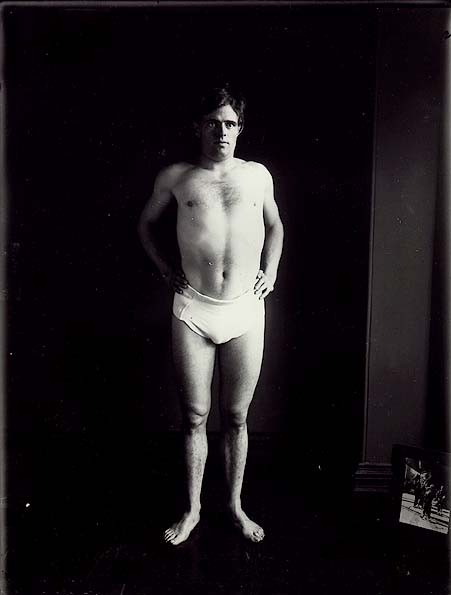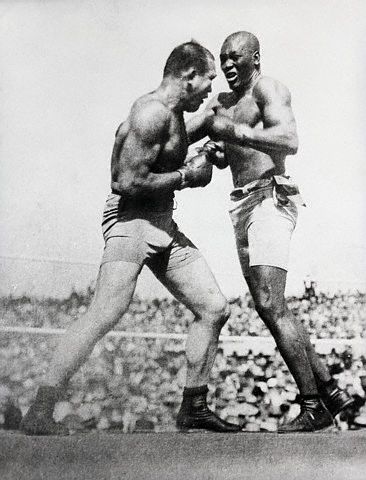Rope-a-dope (2)
By:
June 10, 2010

THE ANNOUNCER came over to Joe. He stood up. His bath robe fell away from him, and he stepped forth to the centre of the ring, naked save for the low canvas shoes and a narrow hip-cloth of white. Genevieve’s eyes dropped. She sat alone, with none to see, but her face was burning with shame at sight of the beautiful nakedness of her lover. But she looked again, guiltily, for the joy that was hers in beholding what she knew must be sinful to behold. The leap of something within her and the stir of her being toward him must be sinful. But it was delicious sin, and she did not deny her eyes. In vain Mrs. Grundy admonished her. The pagan in her, original sin, and all nature urged her on. The mothers of all the past were whispering through her, and there was a clamour of the children unborn. But of this she knew nothing. She knew only that it was sin, and she lifted her head proudly, recklessly resolved, in one great surge of revolt, to sin to the uttermost. —Jack London, “The Game” (1905), chap. 4.
At this point in London’s novel of boxing and love, heroine Genevieve has disguised herself as a man to sneak into a boxing match featuring her beloved, Joe Fleming (in London’s time, women were not admitted to boxing exhibitions). Joe’s skin, she notes, is “fair as a woman’s, far more satiny, and no rudimentary hair-growth mar(s) its white lustre”; his adversary, John Ponta, is “swarthy to blackness, and … covered with a hairy growth that matted like a dog’s on his chest and shoulders.”
We can’t help noting that despite his love of boxing, London wasn’t wearing boxers when the picture above was taken. As the photograph also shows, London’s affinity for whiteness transcended skin color to include his underclothes.

When Jim “Jeff” Jeffries fought the proud, beleaguered black boxing champion Jack Johnson in Reno, Nevada in 1910 (above), London helped to popularize the term “the great white hope.” “Jeff, it’s up to you,” he wrote. “The White Man must be rescued.” He had engaged in similar race-baiting reportage in the prelude to Johnson’s 1908 fight with Tommy Burns. But then London also praised Johnson, the victor in both matches. In a reversal of the whiteness metaphor, he called the boxer “impregnable . . . as inaccessible as Mont Blanc.” London was on hand when that match was fought in Sydney, Australia — accompanied by his wife, Charmian Kittredge, dressed in men’s clothes. (Presumably, London was also fully attired.)
The second in a series about the place of boxing in HiLo culture.
In 2012, HiLoBooks will serialize, then reissue in beautiful paperback form (in May; PRE-ORDER NOW), Jack London’s 1912 science fiction novel The Scarlet Plague. Introduction by HILOBROW’s Matthew Battles. More information here.
